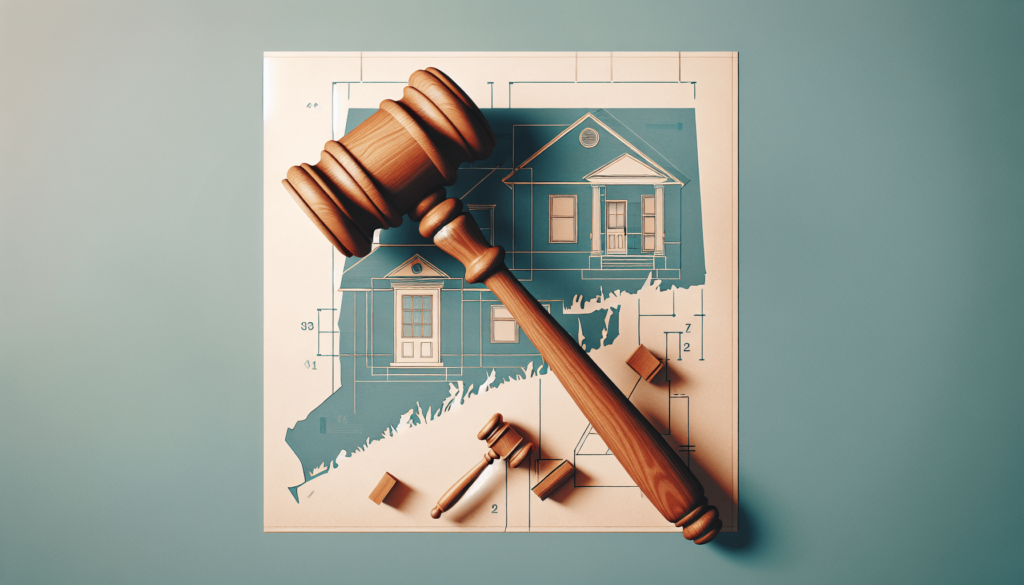Have you ever wondered what consequences you might face for breaking the new home construction laws in Connecticut? It’s important to be aware of the penalties to ensure compliance. In this article, we will explore the potential repercussions of violating these laws and the impact they could have on your construction project. From fines to legal action, understanding the penalties can help you navigate the laws effectively and keep your project on track. So, let’s take a closer look at the consequences that await those who disregard the new home construction laws in Connecticut.

Overview of New Home Construction Laws in Connecticut
Connecticut has implemented comprehensive laws to regulate and govern new home construction within the state. These laws aim to ensure the safety, quality, and compliance of residential construction projects. By understanding the purpose, key provisions, and requirements of these laws, homeowners, builders, and developers can navigate the construction process with confidence and avoid potential violations.
Purpose of the Laws
The primary purpose of the new home construction laws in Connecticut is to safeguard the interests of homeowners and ensure the construction of safe and reliable homes. These laws establish standards for building design, materials, structural integrity, and other critical aspects of residential construction. By adhering to these regulations, builders and developers contribute to the overall well-being and prosperity of the community.
Key Provisions and Requirements
The laws encompass various provisions and requirements that builders and developers must follow to comply with state regulations. These provisions often include obtaining the necessary permits and licenses, adhering to specific construction standards, conducting regular inspections, and employing qualified professionals. Moreover, it is essential to adhere to zoning ordinances, environmental regulations, and other legal requirements to ensure full compliance.
Importance of Compliance
Compliance with the new home construction laws is of utmost importance for several reasons. Firstly, it ensures the safety and well-being of homeowners by minimizing the risk of structural defects, hazardous materials, or other construction-related issues. Additionally, compliance contributes to the overall quality of homes, enhancing their value and desirability. It also promotes consumer confidence in the construction industry and protects against fraudulent or substandard practices. Non-compliance can result in severe consequences, including financial penalties, project delays, or even legal action.

Types of Violations
Violations of the new home construction laws in Connecticut can be categorized into minor violations, major violations, and repeat offenses. Understanding the distinctions between these categories is crucial as it impacts the severity of penalties and potential legal ramifications.
Minor Violations
Minor violations refer to infractions that do not pose an immediate threat to the safety or integrity of the constructed home. These violations may include minor deviations from approved plans, incomplete documentation, or deficiencies in the construction process. While not as serious as major violations, minor violations still require corrective action and compliance with the relevant regulations.
Major Violations
Major violations are more severe in nature and involve significant departures from the required building standards. These violations often pose a direct risk to the safety and well-being of homeowners and may result from serious construction defects, inadequate materials, or insufficient adherence to approved plans. Addressing major violations typically requires substantial remediation and strict compliance to ensure the safety and quality of the home.
Repeat Offenses
Repeat offenses occur when a builder or developer continues to violate the new home construction laws, despite previous sanctions or warnings. These violations display a pattern of non-compliance and may indicate a lack of regard for the regulations and the welfare of homeowners. Repeat offenses often result in escalated penalties and legal consequences, as they demonstrate a persistent failure to meet the required standards.
Penalties for Violations
To ensure compliance with the new home construction laws, Connecticut imposes various penalties on those who violate the regulations. These penalties are designed to deter non-compliance and encourage adherence to the prescribed standards.
Fines and Monetary Penalties
One common penalty for violating the new home construction laws is the imposition of fines or monetary penalties. The amount of the fine typically depends on the severity and frequency of the violation. Fines may vary from a few hundred dollars for minor infractions to substantial amounts for major and repeat offenses. The purpose of these financial penalties is to create a financial burden that encourages builders and developers to prioritize compliance.
Stop Work Orders
In more severe cases, the state authorities may issue a stop work order, halting all construction activities on the project until the violations are rectified and compliance is ensured. This measure is taken to prevent further potential risks to homeowners and emphasize the significance of adhering to the laws. Stop work orders can result in significant delays, additional costs, and negative reputational consequences for the builder or developer.
Revocation of Licenses or Permits
For repeated or egregious violations, the state may take the extreme step of revoking the builder’s or developer’s licenses or permits. This revocation can have devastating consequences for their business, making it difficult to continue operating within the construction industry. Revocation serves as a last resort measure to protect the public from unscrupulous or negligent builders.

Legal Actions and Remedies
In addition to the penalties imposed by the state authorities, individuals affected by construction violations have the option to pursue legal actions to seek remedies and compensation. These legal actions can take various forms, depending on the nature and extent of the violation.
Administrative Actions
One avenue for seeking resolution is through administrative actions, whereby homeowners or affected parties can file complaints with relevant state agencies responsible for overseeing construction. These agencies can conduct investigations into the violations, impose administrative penalties, and take corrective actions to rectify the non-compliance. Administrative actions provide an efficient and accessible means for addressing violations and seeking the necessary remedies.
Civil Lawsuits and Damages
In cases where homeowners suffer harm or financial losses due to construction violations, they may choose to initiate civil lawsuits against the responsible parties. These lawsuits aim to obtain financial compensation for the damages incurred, including repair costs, diminished property value, and emotional distress. Civil litigation allows homeowners to hold violators accountable and seek restitution for the harm caused.
Criminal Charges
In extreme cases where violations involve intentional or reckless conduct, resulting in significant harm or endangering lives, criminal charges may be pursued. Criminal charges can lead to fines, probation, or even incarceration for individuals found guilty of deliberately disregarding the new home construction laws. Criminal proceedings serve as a powerful deterrent to deter intentional misconduct and protect the public from dangerous practices.
Factors Considered in Determining Penalties
When determining the appropriate penalties for violations of the new home construction laws in Connecticut, several factors are taken into account. These factors help authorities establish a fair and proportional response to non-compliance.
Severity of Violation
The severity of the violation is a crucial factor in determining the appropriate penalty. Major violations that pose immediate risks to the safety and quality of the home are treated more severely than minor infractions. The potential harm that could result from the violation weighs heavily in the penalties imposed.
Degree of Negligence
The degree of negligence exhibited by builders or developers is another factor considered in assessing penalties. Intentional violations or significant negligence are treated more harshly, as they demonstrate a disregard for the well-being of homeowners. Conversely, penalties may be less severe for violations resulting from oversight or innocent mistakes.
Injury or Harm Caused
If a violation leads to injury or harm to homeowners or occupants of the home, the penalties are likely to be more severe. The potential for physical harm elevates the importance of swift and strict enforcement to prevent future incidents. Authorities prioritize the protection and welfare of individuals affected by violations, seeking to ensure they receive the necessary remedies and compensation.

Reporting and Investigation Process
To address construction violations effectively, Connecticut has established a robust reporting and investigation process that allows concerned individuals to file complaints and initiate investigations.
Filing Complaints
Affected homeowners or other parties can file complaints with relevant state agencies responsible for overseeing construction regulations. These complaints should include detailed information about the violation, supporting documentation, and any evidence that substantiates the claim. Promptly reporting violations is essential to initiate the investigation process and ensure the timely resolution of the matter.
Investigative Procedures
Upon receiving a complaint, state agencies conduct thorough investigations to determine the veracity of the allegations and the extent of the violations. This process may involve site inspections, reviewing construction plans and documents, and interviewing involved parties. Investigators gather evidence and document their findings to assess the severity of the violations and determine the appropriate penalties.
Documentation and Evidence
Documentation and evidence are critical in both reporting violations and supporting investigations into construction violations. Homeowners and affected parties are encouraged to keep detailed records of the construction process, including photographs, correspondence, contracts, and any other relevant documentation. This documentation strengthens their claims and supports the investigation process, ensuring a more effective resolution.
Appeals and Defenses
Builders and developers facing penalties or legal actions for construction violations have the right to appeal the decisions or mount a defense against the allegations. Understanding the available avenues for appeals and defenses is crucial to protect their rights and interests.
Request for Hearing
Individuals can file a request for a hearing to appeal the penalties imposed or to present a defense against the allegations of non-compliance. This hearing provides an opportunity to present evidence, call witnesses, and argue for a more lenient penalty or the dismissal of charges. It is essential to adhere to the specified deadlines and procedural requirements when requesting a hearing to ensure the appeal process proceeds smoothly.
Legal Counsel and Representation
Seeking legal counsel and representation is strongly recommended when appealing penalties or defending against construction violation allegations. Experienced attorneys specializing in construction law can provide invaluable guidance, knowledge, and expertise throughout the legal proceedings. They can analyze the case, advise on potential defenses, and advocate on behalf of the builder or developer to secure a fair outcome.
Evidence and Witness Testimony
Presenting compelling evidence and witness testimony can be instrumental in mounting an effective defense against construction violation allegations. Builders and developers should gather all pertinent evidence, including documentation, expert opinions, and witness statements, to support their claims. This evidence should aim to demonstrate compliance or establish alternative explanations for the alleged violations. Engaging expert witnesses who can provide unbiased opinions and technical expertise can significantly strengthen defense arguments.

Impact on Homeowners and Buyers
Construction violations have significant implications for homeowners and prospective buyers. Understanding the potential impact is crucial for making informed decisions and protecting their rights.
Financial Loss and Compensation
Homeowners who discover construction violations face the prospect of financial loss and costly repairs. Substantial remediation work may be necessary to rectify defects or ensure compliance with building standards, resulting in unexpected expenses and financial strain. Moreover, violations can diminish the value of the property, affecting the homeowner’s investment. Seeking financial compensation through legal actions or administrative resolutions can help alleviate some of the burdens associated with construction violations.
Safety and Quality Concerns
Construction violations pose serious safety and quality concerns for homeowners and potential buyers. Defective construction, inadequate materials, or non-compliance with building codes can lead to structural instability, fire hazards, or other safety risks. Additionally, violations may compromise the overall quality of the home, affecting its durability, functionality, and energy efficiency. Being aware of these potential risks enables homeowners and buyers to exercise caution and demand compliance with the applicable laws and regulations.
Legal Recourse Available
Fortunately, homeowners and buyers affected by construction violations have legal recourse to seek remedies and ensure their rights are protected. By pursuing administrative actions, civil lawsuits, or criminal charges, those impacted by violations can seek financial compensation, enforce compliance, and hold responsible parties accountable. It is essential to consult with legal professionals to understand the available legal avenues and determine the most suitable course of action.
Preventing Violations
Preventing construction violations is paramount to ensuring the integrity and safety of new home construction projects. Builders, developers, and industry professionals must prioritize compliance with the laws and regulations to minimize the risk of violations.
Education and Training
Thorough education and training programs play a pivotal role in preventing violations. Builders and developers must stay up to date with the latest building codes, regulations, and construction standards. Regular training sessions and workshops can enhance their knowledge and understanding of compliance requirements, fostering a culture of adherence to the laws.
Compliance Audits
Regular compliance audits are an effective tool to identify and rectify potential violations. Builders and developers should conduct internal audits to assess their own practices, processes, and documentation. These audits can help identify areas of improvement, proactively address compliance issues, and ensure ongoing adherence to the requirements.
Collaboration and Communication
Open lines of communication and collaboration between builders, developers, subcontractors, and regulatory authorities are key to preventing violations. Establishing robust communication channels allows for the timely resolution of issues, clarification of requirements, and proactive problem-solving. By fostering a collaborative environment, industry professionals can work together towards compliance and address any concerns or challenges effectively.
Enforcement and Compliance Measures
Enforcing compliance with the new home construction laws requires the active involvement of regulatory authorities and building inspectors. These individuals play a crucial role in ensuring that builders and developers adhere to the prescribed regulations.
Role of Building Inspectors
Building inspectors are responsible for conducting inspections at various stages of the construction process to ensure compliance with the relevant laws and regulations. They review construction plans, conduct on-site inspections, and verify that construction practices align with the approved designs. Building inspectors serve as neutral observers who offer guidance and enforce compliance to protect the interests of homeowners and the wider community.
Inspection Procedures
The inspection procedures involve a systematic evaluation of a construction project to determine compliance with the laws. Inspectors assess various elements, including structural integrity, electrical and plumbing systems, insulation, fire safety measures, and overall compliance with the approved plans. Regular and comprehensive inspections enable the early identification of potential violations and provide an opportunity to rectify them before they escalate into more severe issues.
Penalties for Non-Compliance
Building inspectors have the authority to impose penalties for non-compliance with the new home construction laws. When violations are identified during inspections, inspectors may issue citations, require stop work orders, or impose fines. These penalties incentivize builders and developers to adhere to the regulations and ensure the safety and quality of construction projects.
In conclusion, understanding the new home construction laws in Connecticut and complying with their provisions is crucial for all stakeholders involved in the construction process. Familiarizing oneself with the purpose, key provisions, and requirements of these laws facilitates a safe, reliable, and compliant construction environment. Compliance not only protects the interests and safety of homeowners but also contributes to the overall quality and reputation of the construction industry in Connecticut. By prioritizing compliance, builders and developers can prevent violations, avoid penalties, and uphold the highest standards of construction.



